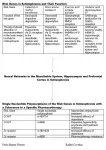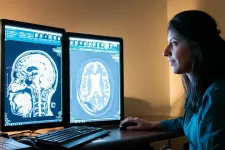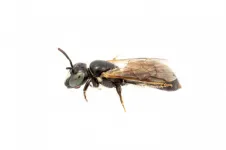INFORMATION:
For more information please visit: https://www.eurekaselect.com/191424/article
Risk genes in schizophrenia - their importance in choosing appropriate antipsychotic drug
This article by Dr. Felix-Martin Werner and Prof. Rafael Coveñas is published in Current Pharmaceutical Design, 2021
2021-02-25
(Press-News.org) Dr. Felix-Martin Werner, working at the Euro Academy Pößneck in Germany and Prof. Rafael Coveñas, working at the Institute of Neurosciences of Castilla and León, Salamanca in Spain, have been working on neurological and psychiatric disease for over ten years. In their most recent review, published in Current Pharmaceutical Design (Bentham Science Publishers) Werner and Coveñas cover information about the risk genes in schizophrenia and explain the importance of examining their single nucleotide polymorphisms (SNP's). In schizophrenia, 260 risk genes have been discovered, and an association between single SNPs and the clinical efficacy of a specific antipsychotic drug has been established. Among the risk genes in schizophrenia, the COMT, MAO A/B, GAD 67, DAOA, dysbindin-1 and neuregulin-1 genes are described, and their functions can be represented by an updated neural network model of the ventral tegmental area, hippocampus and prefrontal cortex. The COMT and MAO A/B genes encode a decreased dopamine degradation. As a consequence, dopamine hyperactivity via D2 receptors occurs in the hippocampus and ventral tegemental area. The GAD 67 gene encodes a GABA dysfunction. Consequently, GABAergic neurons weakly inhibit D2 dopaminergic neurons in the hippocampus and ventral tegmental area via GABAA receptors. The DAOA gene encodes a glutamatergic dysfunction. This leads to a weak presynaptic inhibition of 5-HT2A serotonergic neurons in the hippocampus and ventral tegmental area via NMDA receptors. Dysbindin-1 and neuregulin-1 genes encode as well a glutamatergic dysfunction. The most important SNPs, which show an association with a specific pharmacotherapy, are mentioned. The SNP rs169774 of the COMT gene and the SNP rs1801028 of the D2 receptor gene are linked with an increased efficacy of the antipsychotic drug risperidone. The SNP of the COMT and D2 receptor genes are related with a dopamine hyperactivity psychosis and treatment resistance. Patients suffering both hyperactivity and resistance could be treated with the antipsychotic drug clozapine in combination with the novel antipsychotic drug cariprazine. This drug combination improves the PANSS total score in treatment-resistant schizophrenic patients. "By examining in a cohort of schizophrenic patients the SNPs of the risk genes, it will be possible to differentiate patients with a good response to a specific antipsychotic drug from those with treatment resistance," notes Dr. Werner.
ELSE PRESS RELEASES FROM THIS DATE:
Artificial 'brain' reveals why we can't always believe our eyes
2021-02-25
A computer network closely modelled on part of the human brain is enabling new insights into the way our brains process moving images - and explains some perplexing optical illusions.
By using decades' worth of data from human motion perception studies, researchers have trained an artificial neural network to estimate the speed and direction of image sequences.
The new system, called MotionNet, is designed to closely match the motion-processing structures inside a human brain. This has allowed the researchers to explore features of human visual processing that cannot be directly measured in the brain.
Their study, published in the Journal of Vision, uses the artificial system ...
Harnessing the power of proteins in our cells to combat disease
2021-02-25
Over many decades now, traditional drug discovery methods have steadily improved at keeping diseases at bay and cancer in remission. And for the most part, it's worked well.
But it hasn't worked perfectly.
A lab on UNLV's campus has been a hub of activity in recent years, playing a significant role in a new realm of drug discovery -- one that could potentially provide a solution for patients who have run out of options.
"It's starting to get to the point where we've kind of taken traditional drug discovery as far as we can, and we really need something new," said UNLV biochemist Gary Kleiger.
Traditional drug discovery involves what is called the small molecule approach. To attack a protein that's causing disease in a cancer cell, for instance, ...
Toronto's COVID-19 bike lane expansion boosted access to jobs, retail
2021-02-25
With COVID-19 making it vital for people to keep their distance from one another, the city of Toronto undertook the largest one-year expansion of its cycling network in 2020, adding about 25 kilometres of temporary bikeways.
Yet, the benefits of helping people get around on two wheels go far beyond facilitating physical distancing, according to a recent study by three University of Toronto researchers that was published in the journal Transport Findings.
University of Toronto Engineering PhD candidate Bo Lin, as well as professors Shoshanna Saxe and Timothy Chan used ...
Male lyrebirds create an "acoustic illusion" to snare potential mates
2021-02-25
Ithaca, NY--Famous for their uncanny ability to imitate other birds and even mechanical devices, researchers find that Australia's Superb Lyrebird also uses that skill in a totally unexpected way. Lyrebirds imitate the panicked alarm calls of a mixed-species flock of birds while males are courting and even while mating with a female. These findings are published in the journal Current Biology.
"The male Superb Lyrebird creates a remarkable acoustic illusion," says Anastasia Dalziell, currently a Cornell Lab of Ornithology Associate and recent Cornell Lab Rose Postdoctoral Fellow, now at the ...
Smaller plates help reduce food waste in campus dining halls
2021-02-25
URBANA, Ill. - Food waste is a major problem in the U.S., and young adults are among the worst culprits. Many of them attend college or university and live on campus, making dining halls a prime target for waste reduction efforts. And a simple intervention can make a big difference, a University of Illinois study shows.
Shifting from round to oval plates with a smaller surface area can significantly reduce food waste in dining halls, says Brenna Ellison, associate professor in the Department of Agricultural and Consumer Economics (ACE) and co-author on the study.
"Americans waste about 31% of the food that is available at the retail and consumer levels," Ellison says. "All-you-can-eat ...
New radiology research shows promising results for focused ultrasound treatment of Alzheimer's
2021-02-25
West Virginia University scientists used MRI scans to show what happens when ultrasound waves target a specific area of Alzheimer's patient's brains. They concluded that this treatment may induce an immunological healing response, a potential breakthrough for a disease that accounts for up to 80% of all dementia cases.
Rashi Mehta, a researcher with the WVU School of Medicine and Rockefeller Neuroscience Institute, led the study that appears in the journal Radiology.
"Focused ultrasound is an innovative technique and new way of approaching brain diseases, including Alzheimer's disease," said Mehta, an associate professor ...
Study finds changes in gut microbiome connected to Alzheimer's-like behavior
2021-02-25
New research in mice published today in the journal Scientific Reports strengthens the growing scientific consensus regarding the role of the gut microbiome in neurodegenerative disorders including Alzheimer's disease.
The study, led by researchers at Oregon Health & Science University, found a correlation between the composition of the gut microbiome and the behavioral and cognitive performance of mice carrying genes associated with Alzheimer's. The mice carried the human amyloid precursor protein gene with dominant Alzheimer's mutations generated by scientists in Japan.
The study further suggests a relationship between microbes in the digestive tract ...
Rare bee found after 100 years
2021-02-25
A widespread field search for a rare Australian native bee not recorded for almost a century has found it's been there all along - but is probably under increasing pressure to survive.
Only six individual were ever found, with the last published record of this Australian endemic bee species, Pharohylaeus lactiferus (Colletidae: Hylaeinae), from 1923 in Queensland.
"This is concerning because it is the only Australian species in the Pharohylaeus genus and nothing was known of its biology," Flinders University researcher James Dorey says in a new scientific paper in the journal Journal of Hymenoptera Research.
The ...
Researchers map metabolic signaling machinery for producing memory T cells
2021-02-25
Immunologists at St. Jude Children's Research Hospital have mapped the previously unknown biological machinery by which the immune system generates T cells that kill bacteria, viruses and tumor cells.
The findings have multiple implications for how the adaptive immune system responds to infections to generate such memory T cells. The experiments revealed mechanisms that inhibit development of the long-lived memory T cells that continually renew to protect the body over time. Blocking these inhibitory mechanisms with pharmacological or genetic approaches could boost protective immunity against infection and cancers.
The researchers also discovered a subtype of memory T cells that they named terminal effector prime cells. Mapping the pathway that controls these cells raises the possibility ...
Plant-based diets improve cardiac function, cognitive health
2021-02-25
(Boston)--What if you could improve your heart health and brain function by changing your diet? Boston University School of Medicine researchers have found that by eating more plant-based food such as berries and green leafy vegetables while limiting consumption of foods high in saturated fat and animal products, you can slow down heart failure (HF) and ultimately lower your risk of cognitive decline and dementia.
Heart failure (HF) affects over 6.5 million adults in the U.S. In addition to its detrimental effects on several organ systems, presence of HF is associated with higher risk of cognitive decline and dementia. Similarly, changes in cardiac structure ...
LAST 30 PRESS RELEASES:
Scientists sharpen genetic maps to help pinpoint DNA changes that influence human health traits and disease risk
AI, monkey brains, and the virtue of small thinking
Firearm mortality and equitable access to trauma care in Chicago
Worldwide radiation dose in coronary artery disease diagnostic imaging
Heat and pregnancy
Superagers’ brains have a ‘resilience signature,’ and it’s all about neuron growth
New research sheds light on why eczema so often begins in childhood
Small models, big insights into vision
Finding new ways to kill bacteria
An endangered natural pharmacy hidden in coral reefs
The Frontiers of Knowledge Award goes to Charles Manski for incorporating uncertainty into economic research and its application to public policy analysis
Walter Koroshetz joins Dana Foundation as senior advisor
Next-generation CAR-T designs that could transform cancer treatment
As health care goes digital, patients are being left behind
A clinicopathologic analysis of 740 endometrial polyps: risk of premalignant changes and malignancy
Gibson Oncology, NIH to begin Phase 2 trials of LMP744 for treatment of first-time recurrent glioblastoma
Researchers develop a high-efficiency photocatalyst using iron instead of rare metals
Study finds no evidence of persistent tick-borne infection in people who link chronic illness to ticks
New system tracks blockchain money laundering faster and more accurately
In vitro antibacterial activity of crude extracts from Tithonia diversifolia (asteraceae) and Solanum torvum (solanaceae) against selected shigella species
Qiliang (Andy) Ding, PhD, named recipient of the 2026 ACMG Foundation Rising Scholar Trainee Award
Heat-free gas sensing: LED-driven electronic nose technology enhances multi-gas detection
Women more likely to choose wine from female winemakers
E-waste chemicals are appearing in dolphins and porpoises
Researchers warn: opioids aren’t effective for many acute pain conditions
Largest image of its kind shows hidden chemistry at the heart of the Milky Way
JBNU researchers review advances in pyrochlore oxide-based dielectric energy storage technology
Novel cellular phenomenon reveals how immune cells extract nuclear DNA from dying cells
Printable enzyme ink powers next-generation wearable biosensors
6 in 10 US women projected to have at least one type of cardiovascular disease by 2050
[Press-News.org] Risk genes in schizophrenia - their importance in choosing appropriate antipsychotic drugThis article by Dr. Felix-Martin Werner and Prof. Rafael Coveñas is published in Current Pharmaceutical Design, 2021







